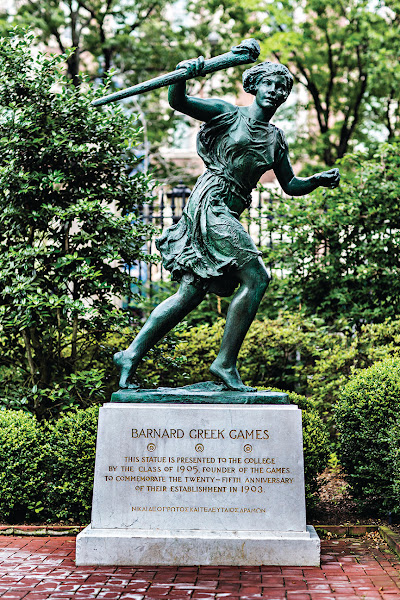Monday, August 14, 2023
Typographical Error on a Statue?
Barnard Greek Games statue (click once or twice to enlarge):
Elizabeth Parker, "The Spirit of the Greek Games" (November 15, 2010):
Hi Michael,
I don't think there's an error in the inscription. The pi has a small hook on the right hand side, like That shape for pi is a common ancient shape for the letter.
All best,
David Driscoll
See the "Table of Letters" in L.H. Jeffery, The Local Scripts of Archaic Greece: A Study of the Origin of the Greek Alphabet and its Development from the Eighth to the Fifth Centuries B.C., rev. ed. (Oxford: Clarendon Press, 1963).
Related post: An Unfortunate Misprint.
Newer› ‹Older
In addition to the information about the Class of 1905, the pedestal has a line from Aeschylus’s play, Agamemnon, engraved in its base.Aeschylus, Agamemnon 314:ΝΙΚΑΙΔΕΟΓΡΩΤΟΣΚΑΙΤΕΛΕΥΤΑΙΟΣΔΡΑΜΩΝTranslated into English, it reads “Victor is he that runs first and last,” meaning that in a torch or relay race, victory is won by all the runners on a team, not just the swiftest participant. However, astute readers of ancient Greek will notice that the chiseler of the inscription replaced the letter Π (Pi), the first letter of the word “protos” or first, with a Γ (Gamma), turning the word into “grotos,” which has no meaning.
This apparently went unnoticed until 1961, when an astute reader sent a Letter to the Editor in the Barnard Bulletin, to call attention to the gaffe.
νικᾷ δ᾽ ὁ πρῶτος καὶ τελευταῖος δραμών.Hat tip: Eric Thomson.
Hi Michael,
I don't think there's an error in the inscription. The pi has a small hook on the right hand side, like That shape for pi is a common ancient shape for the letter.
All best,
David Driscoll
See the "Table of Letters" in L.H. Jeffery, The Local Scripts of Archaic Greece: A Study of the Origin of the Greek Alphabet and its Development from the Eighth to the Fifth Centuries B.C., rev. ed. (Oxford: Clarendon Press, 1963).
Related post: An Unfortunate Misprint.
Labels: typographical and other errors


